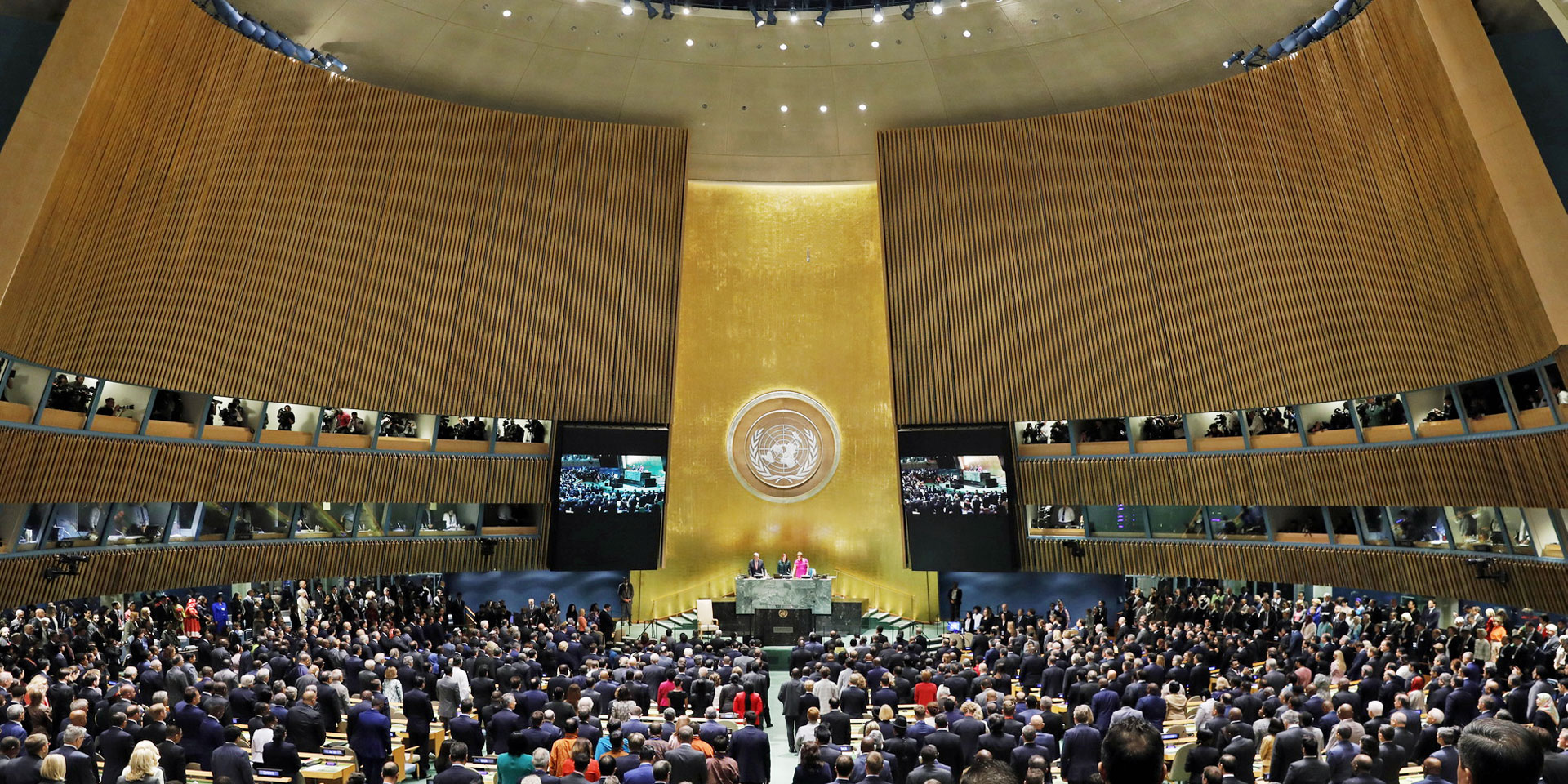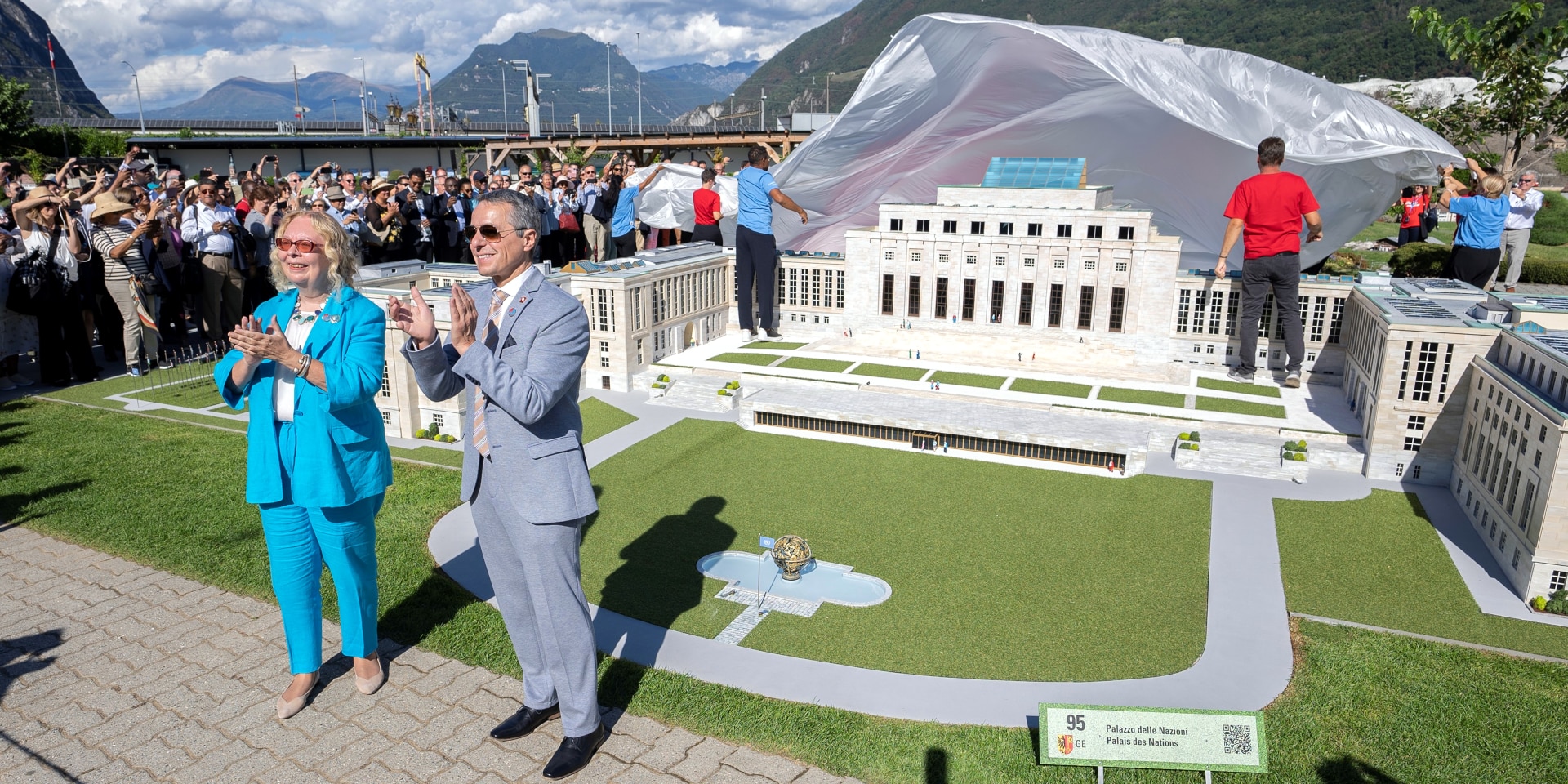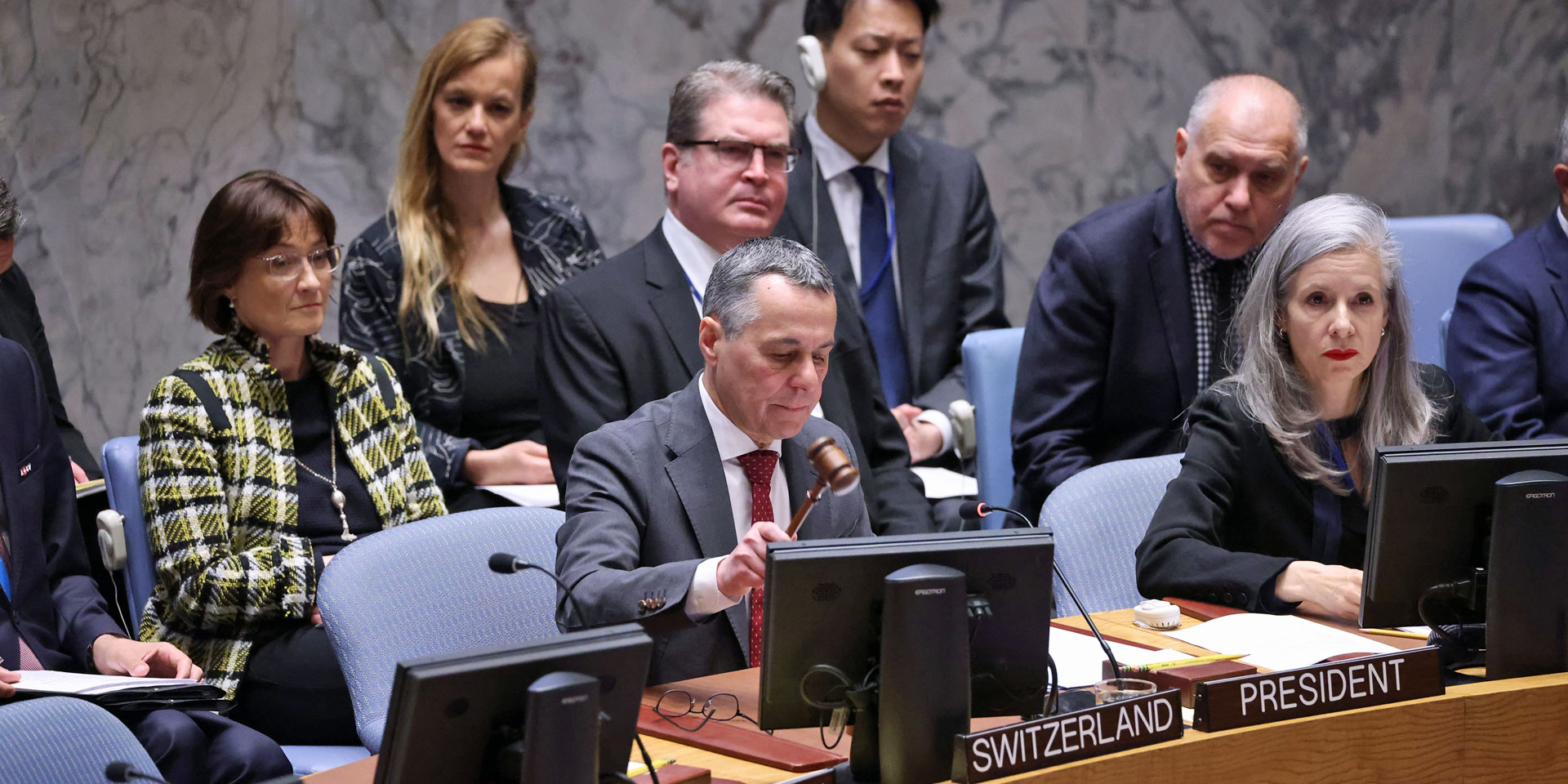Opening week of the 78th session of the UN General Assembly
Swiss President Alain Berset and Federal Councillor Ignazio Cassis will attend the high-level opening week of the 78th UN General Assembly from 18 to 20 September. The gathering of numerous heads of state and government in New York makes it possible to hold many bilateral meetings in a short time. Events during the week provide a platform for addressing and promoting solutions and compromises for global challenges such as conflicts or environmental pollution. President Berset will deliver the opening speech to the international community on behalf of Switzerland. All news on the news platform.
20.09.2023 – The practice of arbitrary detention to be put to an end
Numerous states arbitrarily detain people and use them as leverage in their foreign policy relations. This issue is highly topical, as the prisoner exchange between the USA and Iran last Monday shows.
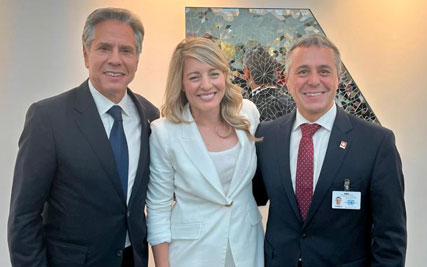
To put an end to the practice of arbitrary detention, the Canadian foreign minister, Mélanie Joly, the US secretary of state, Antony Blinken, and their counterpart Arnoldo André Tinoco from Costa Rica organised an exchange at foreign minister level in New York. This gave more momentum to the Canadian initiative on 'Arbitrary Detention in Inter-State Relations'.
With his participation in the dialogue, Federal Councillor Ignazio Cassis underlined Swiss solidarity and support for the initiative. Among other things, through its good offices Switzerland works to ensure that persons affected are released from arbitrary detention. The issue was already in the spotlight during the bilateral meeting between Mr Cassis and Ms Joly in Ottawa last Monday.
20.09.2023 – Meetings with the Foreign Ministers of Armenia and Azerbaijan
During the opening week of the UN General Assembly, Federal Councillor Cassis met Armenian Foreign Minister Ararat Mirzoyan and Azerbaijan’s Foreign Minister Jeyhun Bayramov for bilateral talks. Switzerland is ready to contribute to dialogue and sustainable peace if the parties agree.
20.09.2023 – Meeting between Federal Councillor Cassis and Iranian Foreign Minister Amir-Abdollahian
At his meeting with Iranian Foreign Minister Hussein Amir-Abdollahian, Federal Councillor Ignazio Cassis welcomed the resumption of bilateral relations between Iran and Saudi Arabia. This will contribute to easing tensions in the Middle East.
The unresolved nuclear issue was also a topic of discussion. The Federal Council emphasised Switzerland's readiness to support any diplomatic solution to this issue, especially in cooperation with the International Atomic Energy Agency (IAEA).
20.09.2023 – Support for nuclear safety in Ukraine
Ignazio Cassis and the director general of the International Atomic Energy Agency (IAEA) Rafael Grossi exchanged views for the third time within a year. This underlines the importance Switzerland attaches to nuclear safety, especially in the context of the war in Ukraine. In his discussions with Mr Grossi, the head of the FDFA emphasised that Switzerland remains concerned about the situation of the Zaporizhzhya nuclear power plant. Against this backdrop, Mr Cassis announced that Switzerland will support the IAEA with CHF 1 million for its missions in Ukraine. This financial contribution is in addition to Switzerland's material support with iodine tablets and protective suits.
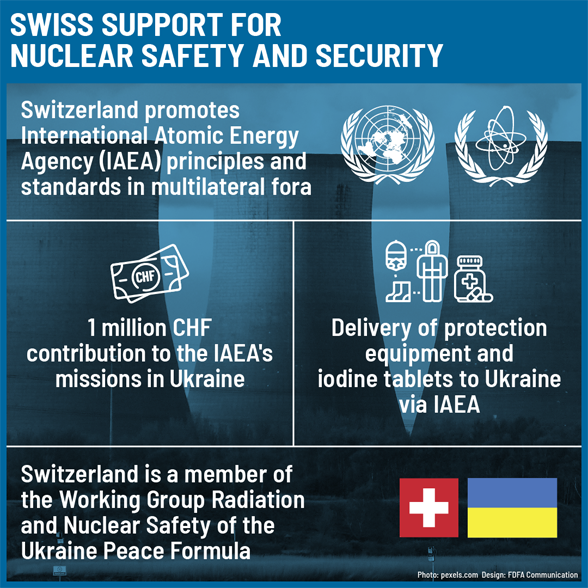
The financial and material support is part of Switzerland's strong commitment to nuclear security and safety in Ukraine. Switzerland also actively supports compliance with existing IAEA standards. For example, during its presidency of the UN Security Council in May 2023, Switzerland facilitated the presentation of the five principles of the IAEA for the protection of the Zaporizhzhya nuclear power plant. The principles are as follows: no attacks of any kind from or against the nuclear power plant; no storage or stationing of heavy weapons or troops at the plant; no threat to the external power supply; protection of all systems necessary for safe operation against attacks or acts of sabotage; no actions that undermine these principles. The head of the FDFA reiterated at the time that the protection of the nuclear power plant is a matter of respect for international humanitarian law.
In addition to its cooperation with the IAEA, Switzerland is also active in the Radiation and Nuclear Safety working group. This is part of Ukrainian President Volodymyr Zelenskyy's peace plan. Within the working group, Switzerland is committed to ensuring that the group's work is in line with the five principles and existing IAEA processes.
20.09.2023 – UN Security Council: President Berset represents Switzerland at Ukraine debate
President Berset took part in a debate on Ukraine in the Security Council. The debate took place under the Albanian chairmanship during the opening week of the UN General Assembly and in the presence of Ukrainian President Volodymyr Selenskyj. The Swiss President underlined the central importance of the UN Charter for peace and security in the world. However, the number of conflicts is increasing and with it the suffering of the civilian population. Alain Berset condemned Russia's military aggression against Ukraine. It is a striking example of a breach of the UN Charter principles. The President of the Swiss Confederation called on Russia to cease all hostilities and immediately withdraw its troops from Ukrainian territory.
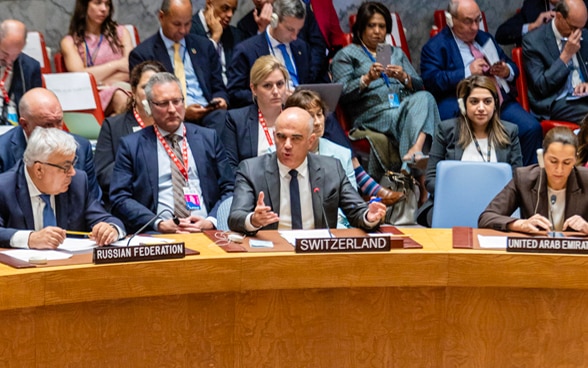
The consequences of Russia's military aggression against Ukraine are being felt around the world. Food security is in jeopardy, the energy sector is affected and nuclear risks are increasing. That is why strong multilateralism and mutual trust are more important than ever to achieve peace in Ukraine.
The task of rebuilding Ukraine in accordance with the Lugano Principles is immense. Switzerland shows solidarity with the Ukrainian people in many ways. Among other things, it supports humanitarian demining with expertise and material supplies, and plans to further expand this commitment. The President also called for a return to the Black Sea Grain Initiative.
Statement by President Alain Berset at the UN Security Council, 20.09.2023
20.09.2023 – Bilateral talks with the Estonian Foreign Minister
The meeting between Federal Councillor Ignazio Cassis and Estonian Foreign Minister Margus Tsahkna focused on the cooperation programme between Switzerland and Estonia, European security issues and support for refugees from Ukraine.
20.09.2023 – UN Security Council: the cohesion of non-permanent members is important for an effective Security Council
Federal Councillor Ignazio Cassis represented Switzerland at a joint press stakeout of the ten elected non-permanent members of the UN Security Council (E10). UN Security Council news overview. The E10 make up two thirds of the Security Council. As a Security Council decision – on a resolution, for example – requires nine affirmative votes, the E10 are key to the Security Council being able to carry out its task of maintaining peace and security in the world.
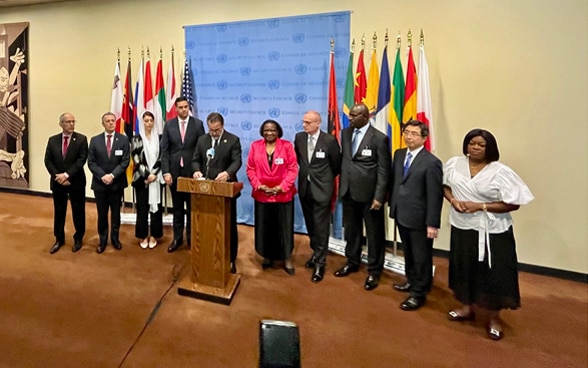
In their joint press stakeout, the E10 underlined their cohesion and commitment to multilateralism: "We will continue to play a constructive role with the aim of building bridges and finding meaningful compromises on all the issues the Security Council deals with. We have seen the significant peacekeeping measures that the Security Council can take when it is united." During meetings held last August on Lake Geneva, the E10 deepened their cooperation. "An efficient, transparent and effective Security Council is more important than ever in today's world. I am all the more pleased about the cohesion of the E10 who are pursuing this goal together," said Cassis following the event in New York.
20.09.2023 – Plastic pollution in the environment must be significantly reduced
The next decades will be crucial, because our way of life is pushing our planet to its limits – especially in the area of plastic disposal. "We need concrete action, but also coordinated work among the different international actors," said Federal Councillor Ignazio Cassis at a ministerial meeting organised by the High Ambition Coalition to End Plastic Pollution. The coalition comprises 60 states, including Switzerland. They have set themselves the goal of introducing a legally binding international treaty on plastic by 2024, in order to significantly reduce the pollution of the environment by plastics. Negotiations among UN member states are currently under way. The instrument to end plastic pollution must contribute in three ways: reducing plastic production, reducing consumption and enabling a safe circular economy for plastic waste management.
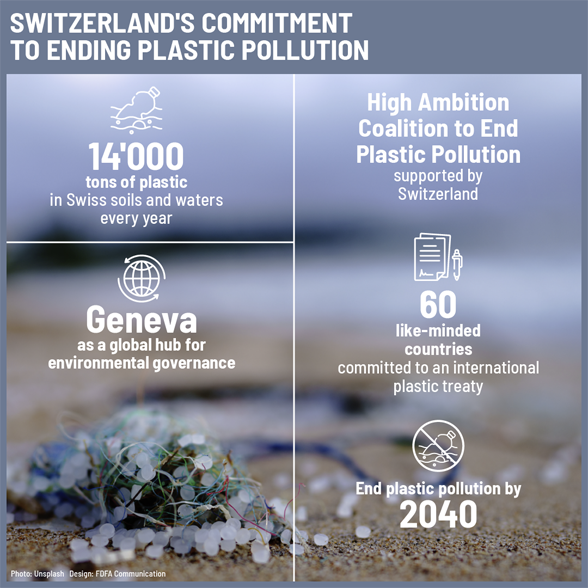
"An effective treaty would contribute substantively to reducing pollution and to protecting the climate," said Federal Councillor Ignazio Cassis in his remarks. Switzerland is actively involved in the negotiations of this treaty and, as a member of the coalition, will continue to advocate for a treaty that protects the environment and human health from plastic pollution. The expertise concentrated in International Geneva has the potential to significantly aid in the achievement of this ambitious goal, and is therefore of crucial importance. This was also emphasised by Mr Cassis: "As the centre for chemical and waste governance, Geneva is the hub for international governance on pollution."
Ending plastic pollution: speech by Federal Councillor Ignazio Cassis
20.09.2023 – Federal Councillor Ignazio Cassis’ meetings of the day
19.09.2023 – Bilateral meeting with the Turkish Foreign Minister
Federal Councillor Ignazio Cassis met the Turkish Foreign Minister Hakan Fidan for bilateral talks on the margins of the UN General Assembly. The talks focused on deepening bilateral relations as well as on regional and international issues.
19.09.2023 – The crime of aggression through wars of aggression must be punished more severely
"Switzerland is convinced that accountability for the crime of aggression is essential and stands firmly behind the International Criminal Court," said Federal Councillor Ignazio Cassis at a ministerial meeting in New York. The dialogue, organised by German Foreign Minister Annalena Baerbock, focused on a future reform of the Rome Statute of the International Criminal Court (ICC). Discussions focused on closing the jurisdictional gap for the crime of aggression in certain situations and thus strengthening the ICC. An ICC adapted to geopolitical realities is more important than ever. In particular, it must be possible to hold those responsible for wars of aggression more systematically accountable. "The military aggression against Ukraine shows the relevance of the issue, and we regret that the ICC is currently not empowered to investigate the crime of aggression in Ukraine," the FDFA head said.
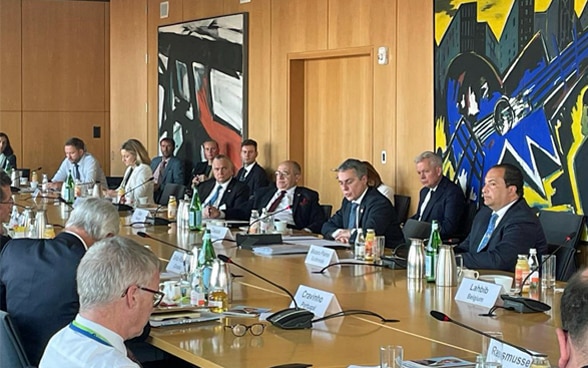
The ICC has jurisdiction over the most serious crimes. These include genocide, crimes against humanity, war crimes and crimes of aggression. The ICC has the task of bringing those responsible to justice in cooperation with the member states of the Rome Statute, which is the basis for the ICC. Switzerland has supported the ICC since its foundation in 2002 and is committed to upholding the principles of the Rome Statute, because international jurisdiction is central to sustainable peace in the world. The Statute celebrates its 25th anniversary this year.
19.09.2023 – Federal Councillor Ignazio Cassis meets with US Secretary of State Antony Blinken
US Secretary of State Antony Blinken thanked Federal Councillor Ignazio Cassis during a brief meeting on the sidelines of the UN General Assembly for Switzerland's role in the release of American prisoners in Iran yesterday.
19.09.2023 – Federal Councillor Ignazio Cassis meets OSCE Secretary General Helga Schmid
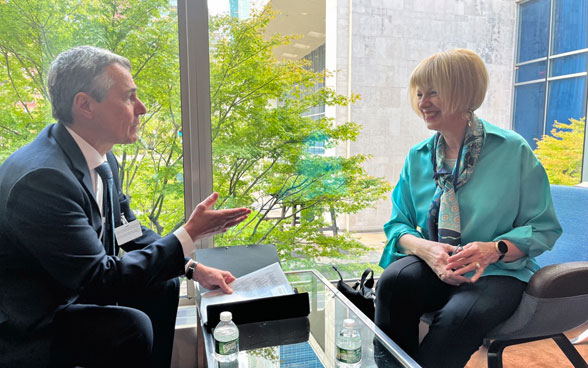
Federal Councillor Ignazio Cassis met with Helga Schmid, the secretary general of the OSCE, in New York. The OSCE is an important platform of 57 states for peace and security in Europe, its neighbouring regions and the world. Against the backdrop of Russia's military aggression against Ukraine, the OSCE, like all other organisations and institutions, faces serious challenges. For example, due to the blocking of individual member states, it has not yet been possible to reach a decision on the OSCE chairmanship for 2024 and on the renewal of the four most senior OSCE executive posts. During the talks, the head of the FDFA assured the OSCE of Switzerland's active support in its search for a solution and in finding a compromise.
19.09.2023 – Switzerland's opening address to the UN General Assembly: focusing on inequality, peace, human rights, war in Ukraine and climate change
President Alain Berset delivered the traditional opening address on behalf of Switzerland to the UN General Assembly. The heads of state of UN member states present the key challenges and opportunities from their own country's perspective that need to be tackled at the multilateral level. Before the assembled international community, Switzerland underlined the need for greater cooperation between states to reduce growing inequalities, promote peace, guarantee human rights, mitigate the consequences of the war in Ukraine and address the effects of climate change.
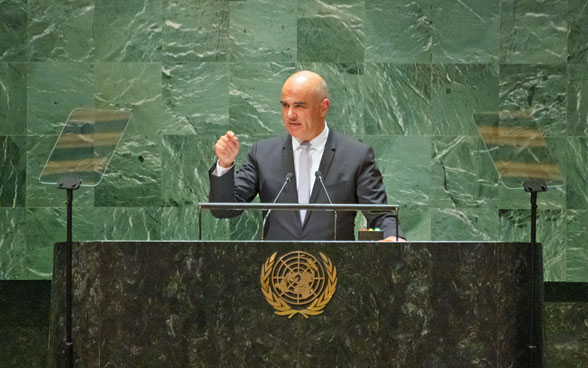
Inequalities within and between countries are increasing. For example, the gap between the richest 10% and the poorest 50% of the world's population has doubled in the last 20 years. Inequalities disproportionately affect and further weaken the weakest in a society. They also endanger democracies, promote instability and populism and thus lead to conflicts. Mr Berset stressed that these inequalities must be fought at various levels.
Switzerland is actively working to resolve conflicts. As a member of the UN Security Council, it is strongly committed to promoting sustainable peace and protecting civilians, placing a focus on the causes of these conflicts and crises in the world, including social and gender inequalities and climate change. Achieving this goal requires the building of trust between states. During the Swiss presidency of the Security Council in May 2023, Federal Councillor Ignazio Cassis chaired a debate on this issue, giving the council impetus for future action. Mutual trust is the basis for effective peacebuilding and conflict prevention, giving future generations a chance to live in peace.
Switzerland clearly condemned Russia's military aggression against Ukraine and the accompanying violation of the UN Charter before the UNGA. During his stay in New York, Mr Cassis will meet with Rafael Grossi, the director general of the International Atomic Energy Agency, and others, to discuss nuclear safety issues in Ukraine.
19.09.2023 – Bilateral talks between Federal Councillor Cassis and Greek Foreign Minister Gerapetritis
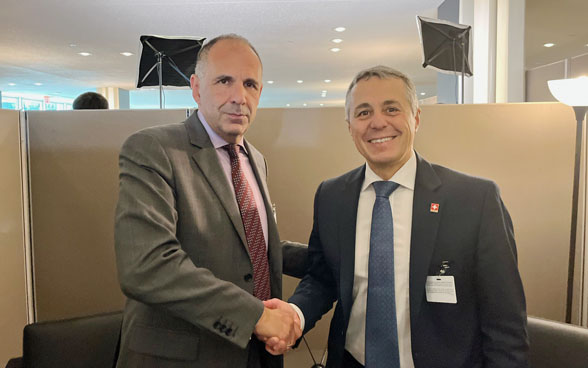
During his meeting with Greek Foreign Minister Giorgos Gerapetritis in New York, Federal Councillor Ignazio Cassis reaffirmed the excellent bilateral relations between the two countries. Out of solidarity and as an expression of this close partnership, Switzerland sent a special operations team and three Super Pumas to Greece at the beginning of September to help the local authorities fight the forest fires and subsequently the floods. Switzerland's European policy was also at the centre of the talks. In this context, FDFA head Cassis underlined the second Swiss contribution to Greece in the area of migration, which makes an important contribution to strengthening stability and cohesion in Europe.
18.09.2023 – Education cannot wait
"Education cannot wait and must become more resilient to crises," Thomas Gürber, Deputy State Secretary of the FDFA and Head of the UN Division, underlined at an event organised by Switzerland, the Roger Federer Foundation, the Global Partnership for Education and the Kenyan government in New York. Education reduces inequalities and creates perspectives. Against the backdrop of the consequences of Covid-19 and numerous crises and conflicts, the participants discussed the importance of investing in education for the well-being of children.
18.09.2023 – 50 years of Germany's UN membership
Federal Councillor Ignazio Cassis attended a reception hosted by Germany's Mission to the United Nations in New York on the evening of 18 September 2023, where he met Chancellor Olaf Scholz.
18.09.2023 – Federal Councillor Ignazio Cassis on his way to New York
From 18 to 20 September 2023, Federal Councillor Ignazio Cassis will participate in the opening week of the UN General Assembly (UNGA). In his capacity as head of the FDFA, Mr Cassis and his delegation will also attend thematic events and bilateral meetings, which will focus on the war in Ukraine, combating pollution, and guaranteeing respect for the rule of law and international humanitarian law.
UN General Assembly opening week
UN General Assembly sessions run from September to September each year, commencing with a high-level opening week. Numerous state and government representatives come together for this event at the UN headquarters in New York. This provides Switzerland with an efficient platform to present its foreign policy concerns at official events and bilateral meetings.
The opening week can be used to promote solutions and compromises, deepen bilateral relations and strengthen multilateralism. In view of the current global challenges and new threats to international peace, a strong multilateral system is more important than ever for Switzerland, because the most pressing issues can only be tackled and overcome together.
Links
Documents
- Report: Preview of 78th UN General Assembly session (PDF, 3 Pages, 164.7 kB, English)
- Report on the implementation of Switzerland's priorities for the 77th session of the UN General Assembly (PDF, 5 Pages, 150.1 kB, English)Bericht über die Umsetzung der Prioritäten der Schweiz für die 77. Tagung der UNO-Generalversammlung
Rapport sur la mise en oeuvre des priorités de la Suisse pour la 77e session de l’Assemblée générale de l’ONU
Rapporto sull’attuazione delle priorità della Svizzera per la 77a Assemblea generale dell’ONU

